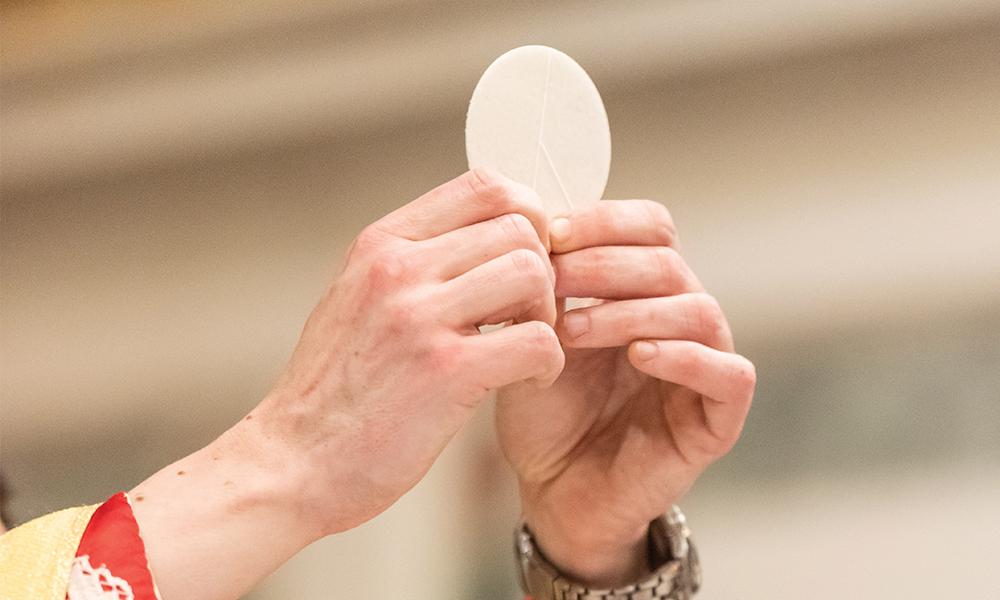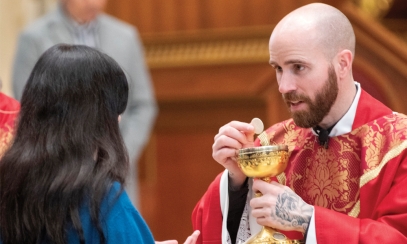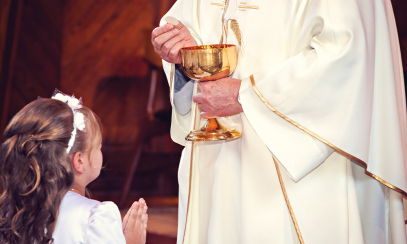
Is the Host Only “Part of” Jesus?
Question: Do we “miss out” on anything if we only receive a Host in Holy Communion?
Question: Do we “miss out” on anything if we only receive a Host in Holy Communion?
Answer: Whether we receive Jesus solely under the form of bread or solely under the form of wine, the Church assures us that we are still receiving “the whole Christ.”
At Christmas, it is beautiful to imagine that we are the Virgin Mary or St. Joseph, holding the Baby Jesus tenderly in our arms. This meditation can also lead us to deeper gratitude for the gift of receiving Jesus in Holy Communion. The connection between Christmas and Communion is profound. The name of the town where the Savior was born is called Bethlehem, which means “House of Bread” – and the place where the newborn King slept is called a manger, which in French means “to eat.”
However, we know that some of the faithful who have severe gluten sensitivity are only able to receive the Eucharist in the form of wine. And during the COVID-19 pandemic, many dioceses restricted the faithful from receiving Jesus under the form of wine at Mass. These circumstances can lead some to wonder if they are “missing out” on anything by only receiving Holy Communion under one form. There are two answers to this question.
First, the Church officially teaches that we do not miss out on anything of substance when we receive the Eucharistic Lord under only one species – that is, under the appearance of bread or under the appearance of wine. In both cases, we receive “the whole Christ” – the second Person of the Holy Trinity with his resurrected body, his precious blood, and his human soul (three elements of his human nature) along with his divinity (the divine nature he possesses from all eternity, since he is truly God.) See the Council of Trent and the Catechism of the Catholic Church, nos. 1374-1378.
Please notice that there is no mention of receiving “Jesus the human person” in Holy Communion. This is because Jesus is not a human person; he is a divine person who in the Incarnation took on a human body and soul in the womb of his mother. Why is this dogma so important? Because it means that the newborn baby crying out in his manger is truly God. It means that when Jesus weeps at the tomb of Lazarus, it is a divine person weeping. And when Christ dies on the Cross to redeem us, it is in a very real sense “God dying to give us life.” This dogma also means that when we receive Holy Communion, we are in some sense “containing the uncontained God,” to quote an ancient Byzantine hymn to the Blessed Mother Mary.
Secondly, even though it is “the whole Christ” that we receive in the Host at Holy Communion, it is legitimate for us to also long for the experience of receiving Jesus under the species of wine. Some people simply enjoy the taste of the form of wine more than the taste of the form of bread, while others might be moved by “the sign value” of receiving Holy Communion from the chalice. For example, the red color may prompt a person to recall Christ’s once-and-for-all sacrifice at Calvary – the same sacrifice that in a mystical but real way is miraculously made present to us in every Mass.



